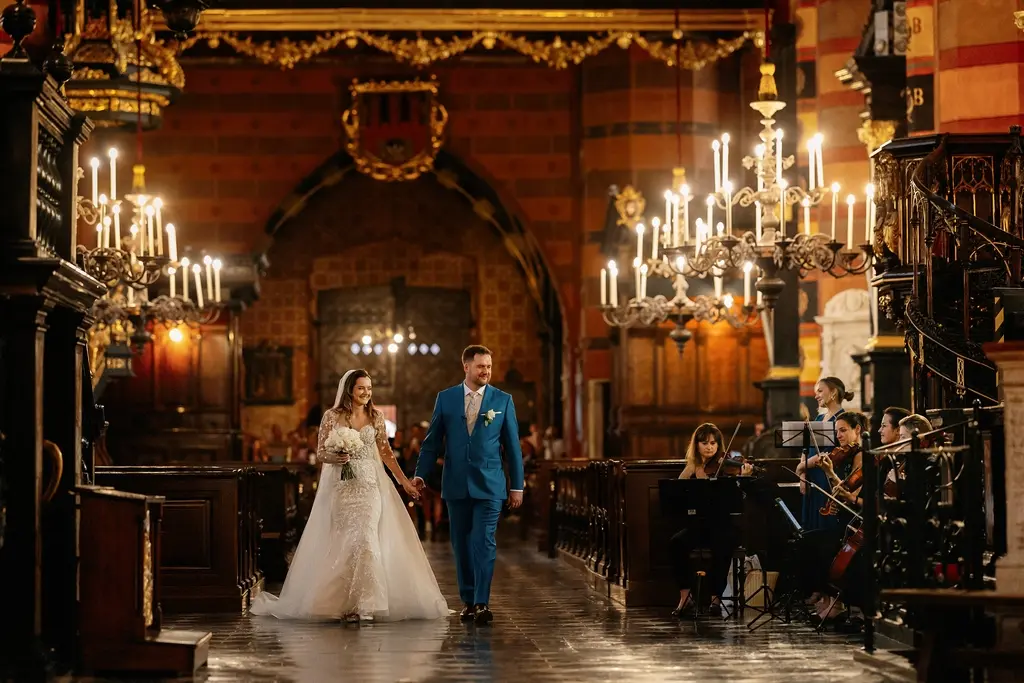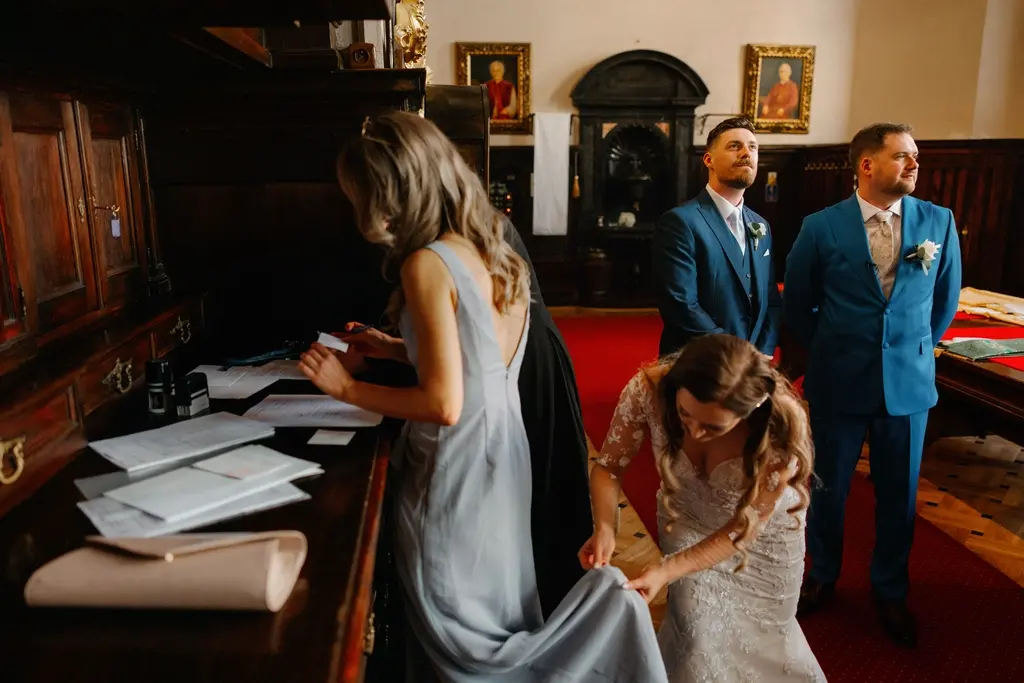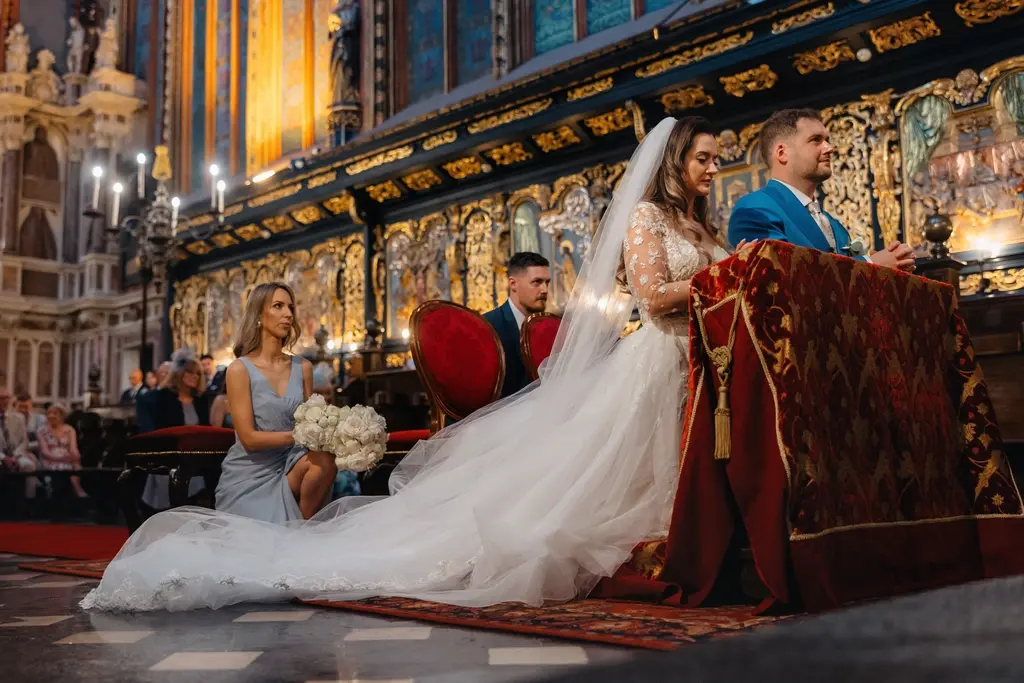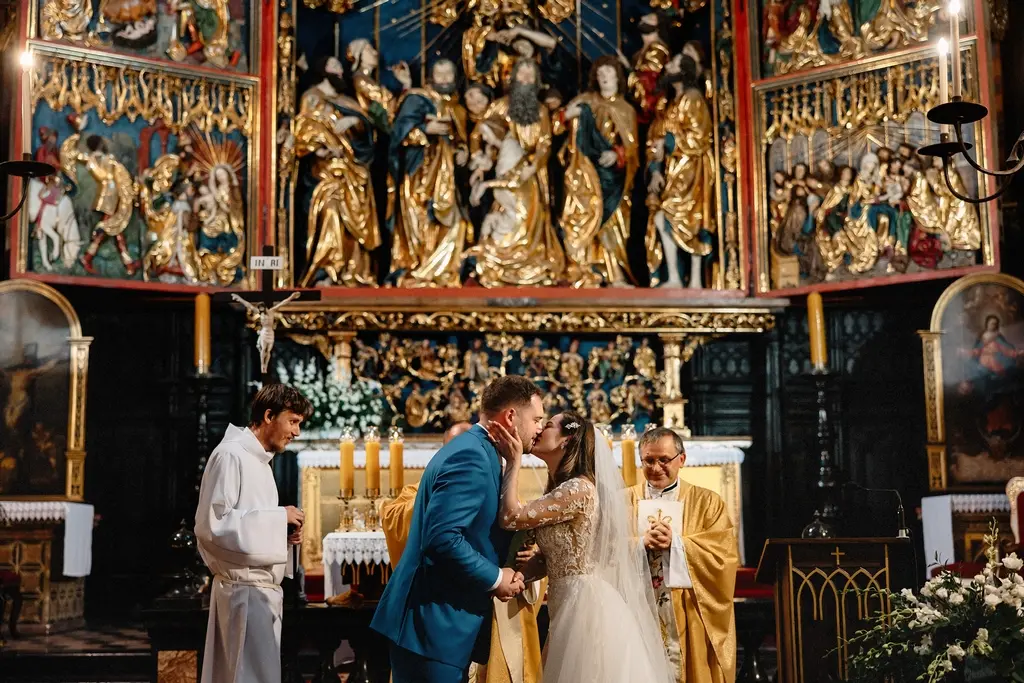A Concordat Wedding – combining spiritual and legal commitment
A concordat wedding in Poland is a unique way to get married that combines a Catholic church ceremony with full legal recognition from the state. In other words – it’s a single event that results in both a spiritual blessing and a legally valid marriage, without the need for a separate civil ceremony at the registry office.

This is possible thanks to the 1998 concordat agreement between the Republic of Poland and the Holy See. Under this arrangement, Catholic clergy are authorised to forward all necessary documents to the civil registry (USC), simplifying the process considerably for couples.
It’s an ideal solution for couples who want to honour their religious beliefs and traditions, while avoiding duplicated paperwork and two separate ceremonies.
No extra visit to the registry office required
One of the biggest advantages of a concordat wedding is that there’s no need to visit the registry office on the wedding day. All required documents can be submitted to the parish office in advance – usually about two months before the planned date of the ceremony.
You’ll typically need:
- valid ID cards or passports,
- a certificate of no impediment to marriage (from the USC – valid for 6 months),
- baptism certificates with confirmation of single status (issued within the last 6 months),
- confirmation of confirmation (bierzmowanie),
- details of your witnesses (names, addresses, PESEL numbers).
In some cases, you may also need documentation confirming a church annulment, if applicable. After the wedding, the priest has five working days to submit the required paperwork to the registry office, after which a legal marriage certificate is issued.
The ceremony – tradition with legal effect
A concordat wedding follows the liturgy of the Catholic Church, with the addition of a short civil declaration during the ceremony. During the celebration:
- the couple confirms their free and conscious will to marry,
- rings are exchanged and vows are spoken,
- the priest reads the legally binding formula of the marriage.

The legal part takes only a few minutes, but it’s this detail that gives the religious ceremony full civil status.
Keep in mind that a concordat wedding involves both spiritual preparation (like pre-marital courses and confession) and administrative requirements – so it’s worth starting the process well in advance.
How to make your ceremony truly personal
Just because your wedding is in church doesn’t mean it has to feel rigid or overly formal. Many parishes are open to personalising the ceremony – as long as it aligns with liturgical guidelines. You might discuss:
- choosing your own readings or psalms,
- custom prayers of the faithful,
- live music (such as a string quartet or soloist),
- floral decorations to match your wedding style.
With the support of a wedding planner, you can create a ceremony that’s not only meaningful and official but also aesthetically beautiful and personally tailored. A planner can help communicate with the parish and ensure all elements are coordinated respectfully – in line with both your wishes and church expectations.

This way, your concordat wedding becomes not only a legal and spiritual event – but a genuinely emotional and memorable experience for everyone involved.
A Concordat Wedding in Poland – a great choice for couples living abroad
More and more couples choose to marry in Poland, even if they live abroad – in the UK, Germany, Norway, Canada or Australia. Why? Poland offers the chance to celebrate in a beautiful and symbolic setting, while respecting both religious traditions and legal formalities.
For couples of faith who want a church wedding with full civil effect, the concordat wedding is the most efficient and elegant option – especially since there’s no need to repeat the process at a registry office.
If one partner is not a Polish citizen, you’ll need a few additional documents:
- passport,
- a certificate of no legal impediment to marriage (with a certified translation),
- possibly legalisation or an apostille, depending on the country.

It’s best to start gathering these documents early – and that’s where professional wedding planning support becomes invaluable.
Why work with a local wedding planner?
If you’re planning your wedding from abroad, teaming up with a Polish wedding planner can save you time, stress and costly mistakes. An experienced planner will:
- explain both civil and church procedures clearly,
- liaise with the right parish and registry office,
- assist with document translation and submission,
- take care of the visual and musical setup of your ceremony,
- manage logistics for you and your guests.
They’ll also act as a trusted bridge between you and Polish institutions – helping you avoid language barriers, administrative confusion or last-minute issues. That way, you can focus on what truly matters: celebrating your love with your closest family and friends in a setting that feels just right.
Wedding Planner Poland | Wedding planning in Poland | WEDDING CEREMONIES IN Poland
Let’s create something beautiful together!
Let’s Wed it!
My name is Kasia and I am a Polish wedding planner.
I believe that good cooperation begins with the first meeting. During our conversation, I will tell you about my experience and explain how I work. I will also explain how I can support you in organising your wedding in Poland. Arrange a meeting with me and then you can decide if I should be your wedding planner!
I speak English, ich spreche Deutsh & hablo un poco Espanol
Keywords: concordat wedding in Poland, concordat wedding, church wedding with legal force, concordat wedding ceremony, church and civil wedding simultaneously

